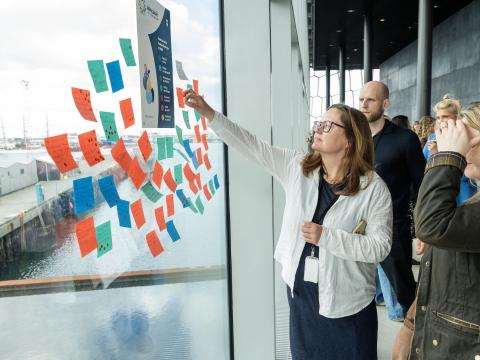Three hundred people help draft new actions for Reykjavík City's Welfare Policy

Nearly 300 people gathered at Harpa on Wednesday to work on a new action plan for Reykjavík City's Welfare Policy. Most attendees came from the Department of Welfare with participation from staff from other departments, elected representatives and various stakeholders.
In 2019, the Welfare Council approved the start of preparations to create Reykjavík City's first Welfare Policy. This started work that many people both inside and outside the City took part in. The Welfare Policy took effect in 2021 and remains valid until 2030. It initially had a five-year action plan. Those five years are now ending, making it time to draft a new action plan.
On Welfare Policy Day, participants worked to answer questions about what results the policy has achieved and what opportunities and challenges exist in the internal and external environment that call for changed priorities in the Department of Welfare's work. They also worked to define which projects should be prioritized in the coming years, based on the main priorities of the Welfare Policy.

The introduction of artificial intelligence is one thing that has characterized recent years and is already starting to affect the work of people in welfare services and elsewhere. It was therefore fitting that the guest speaker for the working day was Brynjólfur Borgar Jónsson, founder of Datalab, a company that provides consultation in artificial intelligence, among other things. He gave an interesting presentation about artificial intelligence and spoke about how everyone now has their own personal assistant in their pocket. Now it's just a question of how to use it at work.
Earlier in the month, managers from the Department of Welfare had gathered and done similar work related to the Welfare Policy. The results from both days will be used to create a new action plan that will be effective from 2026-2030.
Recognized for outstanding performance at work
At the end of the day, the Welfare Council's incentive awards were presented, which are given annually for
outstanding dedication, development or innovation in Reykjavík City's welfare services. Department staff had the opportunity to nominate an individual, workplace, group or project for the awards. The goal of giving the incentive awards is to create an encouraging workplace culture and draw attention to thriving work in Reykjavík City's welfare affairs, as well as promote increased innovation and development work.

In the individual category, Mahmoud F. M. Abusaada, a nurse and head of division at Droplaugarstaðir, received the award. Droplaugarstaðir received the award in the workplace category, and the implementation of the well-being laws in Reykjavík received the award in the project category. Finally, Edda Ólafsdóttir, a social worker, received recognition for successful work in welfare affairs.
Many noteworthy nominations were received by the selection committee, and the committee chose from those nominations. In total, 49 individuals, groups or projects were nominated, with 22 nominated in the individual category, 13 nominated in the groups/workplaces category and 14 nominated in the project category.